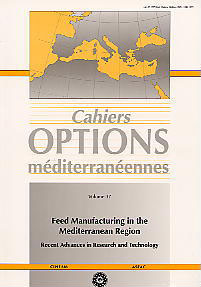| Article précédent | p. 347-363 | Article suivant |
Importance of vitamin E in the oxidative stability of meat: Organoleptic qualities and consequences
Berges E.
The principal factors determining the organoleptic quality of meat are tenderness, colour, and flavour. Storage of meat often leads to the development of abnormal odours and tastes and loss of colour. Oxidation of the lipids of meat and meat by-products can be effectively controlled with antioxidants. This article explains how oxidation of lipids and deterioration in the organoleptic quality of meat occur and how these phenomena can be minimized by including a-tocopherol in animal diets. Dietary alpha-tocopherol is deposited in muscle and fat during the life of the animal and protects against meat oxidation after slaughter.
- [ Afficher ]
- [ Télécharger ]
- [ Exporter la citation ]
Vous pouvez télécharger la citation au format :
- [ Imprimer ]
-
Mots-clés
CHOLESTEROL, LIPIDE, MUSCLE, PROPRIETE ORGANOLEPTIQUE, QUALITE, TOCOPHEROL, VIANDE, VITAMINE ECiter cet article
Berges E. Importance of vitamin E in the oxidative stability of meat: Organoleptic qualities and consequences. In : Brufau J. (ed.), Tacon A. (ed.). Feed manufacturing in the Mediterranean region: Recent advances in research and technology. Zaragoza : CIHEAM, 1999. p. 347-363. (Cahiers Options Méditerranéennes; n. 37). 2. Conference of Feed Manufacturers of the Mediterranean, 1998/03/25-27, Reus (Spain). http://om.ciheam.org/om/pdf/c37/99600036.pdf



